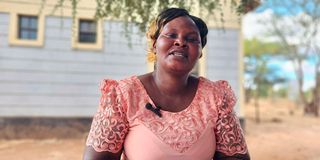The community health promoter who became Luduwai village's most influential village elder

Violet Girigi, the first woman village elder in Luduwai village in Taita Taveta County, during the interview in Taveta on November 6, 2024.
What you need to know:
- Eight years ago, Violet Girigi made history when her community elected her as the first female village elder of Luduwai in Taita Taveta County.
- Despite only having a Class Seven education, she has transformed the role through her tireless dedication - rushing barefoot at midnight to help domestic violence victims among other issues.
Nestled within the vibrant landscape of Taita Taveta County, where the rhythms of culture and community entwine seamlessly, a remarkable transformation has taken root.
Eight years ago, the spirited residents of Luduwai village, home to the resilient Taveta community, demonstrated that change is not merely a dream but a realisable vision. In a public baraza conducted in her absence, they made history by electing Violet Girigi as their village elder.
“I only came to know that I had been elected a village elder through two older men who visited my home late in the evening. They told me they had settled on me and that I must accept their choice and assume the role,” recounts Violet, now 48 years old.
Domestic abuse
Her elevation to this esteemed position took her by surprise; no woman had ever held such a title in Luduwai before.
Yet, over the years, Violet had volunteered tirelessly, stepping into the roles of mediator in cases of domestic abuse, widows’ disinheritance, and maternal emergencies, often accompanying women experiencing labour complications to the hospital.
“The locals must have felt the impact of my work to have chosen me. Remember, that's a very serious meeting because it was overseen by an assistant chief. This position is official, and if you go to Nairobi, you'll find my name there,” she emphasises, her pride evident.
As a village elder, Violet stands as a local administrator under the Ministry of Interior and National Administration, overseeing all the Nyumba Kumi heads in her area.
Shet asserts that her election stands as a testament to the relentless efforts undertaken to advocate for women’s leadership within the community.
“The times are changing, and people have now been sensitised to understand that women can also be leaders,” she states confidently.
Despite only having studied up to Class Seven, her influence and commitment resonate deeply within her community.
Furthermore, Violet serves as a community health promoter, her days often intertwining with chaos, her phone ringing incessantly.
“People call me any time of night,” she sighs, reflecting on the demands of her role.
“There are times I’m alerted at 2am, 8pm, or 10pm, often about a husband beating his wife or a case of defilement. In those cases, I dash out without realising I’m barefoot. My husband usually accompanies me and reminds me I’m not wearing shoes. Whenever I hear such a case, I don't waste time. Those are very serious cases, and if you delay, a woman could be killed, or a child could bleed to death,” she explains, her voice unwavering yet tinged with urgency.
She adds, “The work I do is not for everyone. You really need to have a heart to help. You must be compassionate and empathetic. Otherwise, you can’t manage because some cases are just too horrifying and can drain all your energy.”
Among the most heart-wrenching situations she encounters are those involving widows.
"It hurts me deeply that I must mediate cases where women are treated like outsiders in their own families. They are seen as strangers, despite being the wives of the men who have passed away," she reflects softly, her brow furrowed with concern.
Frequently, she encounters obstinate families’ intent on marginalising these women.
“When mediation fails, I refer them to the assistant chief, and if he cannot help, the matter escalates to the chief,” she explains, though she laments that many widows lose hope amid the bureaucratic process and ultimately endure their abuse in silence.
A particularly vulnerable subset within this group are the widows of Tanzanian descent.
Recently, her efforts to register three such women for Inua Jamii — a State-funded pension scheme intended for the impoverished and elderly — were thwarted; they lacked identity cards despite their desperate need and eligibility for the modest Sh2,000 monthly stipend.
The absence of identification also hampers their children’s access to educational support. One child’s plight, whose Tanzanian mother could not secure a one-off financial aid due to lacking documentation, epitomises this systemic barrier.
"An international NGO was offering Sh6,000 for each child, but since the Tanzanian mother didn’t have ID cards, she had to use her husband's identity and phone number to register. When the money was sent to him, he squandered it all on alcohol, and the child eventually dropped out of school. That truly broke my heart,” she shares, her voice heavy with sorrow.
It's not just widows who suffer; daughters too, fall victim to the ruthless greed of their brothers.
“In this place, brothers snatch away the land or any property allocated to their sisters by their father. They tell them they don't deserve it. It’s appalling,” she laments.
Violet ardently longs for a future when no woman will have to endure such injustices.
"I really don’t want to see women suffer the way they do,” she states, a fierce determination in her eyes that speaks volumes of her commitment to her community.





